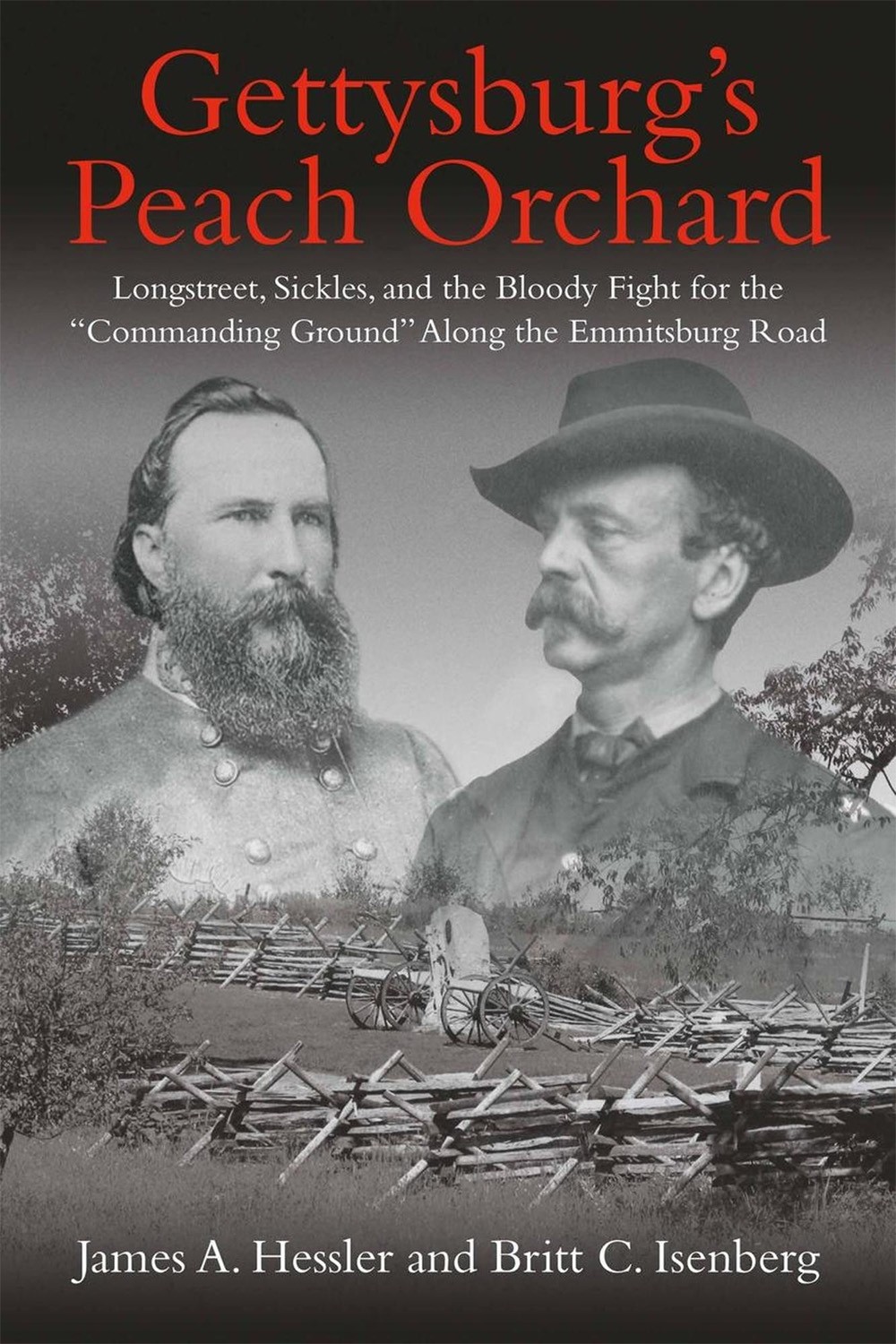site search
online catalog
GETTYSBURG’S PEACH ORCHARD: LONGSTREET, SICKLES, AND THE BLOODY FIGHT FOR THE “COMMANDING GROUND” ALONG THE EMMITSBURG ROAD

Hover to zoom
$34.95 SOLD
Quantity Available: None
Item Code: ST501184
Hessler, James A. and Britt C. Isenberg. 2019, Savas Beattie. Hardcover with dustjacket, 416 pp. 54 images, 26 maps.
More books have been written about the battle of Gettysburg than any other engagement of the Civil War. The historiography of the battle’s second day is usually dominated by the Union’s successful defense of Little Round Top, but the day’s most influential action occurred nearly one mile west along the Emmitsburg Road in farmer Joseph Sherfy’s peach orchard. Despite its overriding importance, no full-length study of this pivotal action has been written until now. James Hessler’s and Britt Isenberg’s Gettysburg’s Peach Orchard: Longstreet, Sickles, and the Bloody Fight for the “Commanding Ground” Along the Emmitsburg Road corrects that oversight.
On July 2, 1863, Confederate Gen. Robert E. Lee ordered skeptical subordinate Lt. Gen. James Longstreet to launch a massive assault against the Union left flank. The offensive was intended to seize the Peach Orchard and surrounding ground along the Emmitsburg Road for use as an artillery position to support the ongoing attack. However, Union Maj. Gen. Daniel Sickles, a scheming former congressman from New York, misinterpreted his orders and occupied the orchard first.
What followed was some of Gettysburg’s bloodiest and most controversial fighting. General Sickles’s questionable advance forced Longstreet’s artillery and infantry to fight for every inch of ground to Cemetery Ridge. The Confederate attack crushed the Peach Orchard salient and other parts of the Union line, threatening the left flank of Maj. Gen. George Meade’s army. The command decisions made in and around the Sherfy property influenced actions on every part of the battlefield. The occupation of the high ground at the Peach Orchard helped General Lee rationalize ordering the tragic July 3 assault known as “Pickett’s Charge.”
This richly detailed study is based upon scores of primary accounts and a deep understanding of the terrain. Hessler and Isenberg, both Gettysburg Licensed Battlefield Guides, combine the military aspects of the fighting with human interest stories in a balanced treatment of the bloody attack and defense of Gettysburg’s Peach Orchard.
“In this finely detailed study of the clash in and around Joseph Sherfy’s Peach Orchard on July 2 at Gettysburg, James Hessler and Britt Isenberg restore the voices of Union andConfederate soldiers of all ranks who demonstrated a depth of courage and commitmentfar too often overshadowed in the historical narrative by controversies centering onGenerals Sickles and Longstreet. Their analysis of the decidedly underappreciated fighting on this front is particularly outstanding. Every student of the fighting on the Union left at Gettysburg will find fresh insights in this deeply researched work.” - Carol Reardon, co-author of A Field Guide to Gettysburg
~~~~~~~~~~~~~~~~~~~~~~~~~~~~~~~~~~~
THIS ITEM, AS WITH ALL OTHER ITEMS AVAILABLE ON OUR WEB SITE,
MAY BE PURCHASED THROUGH OUR LAYAWAY PROGRAM.
FOR OUR POLICIES AND TERMS,
CLICK ON ‘CONTACT US’ AT THE TOP OF ANY PAGE ON THE SITE,
THEN ON ‘LAYAWAY POLICY’.
Inquire About GETTYSBURG’S PEACH ORCHARD: LONGSTREET, SICKLES, AND THE BLOODY FIGHT FOR THE “COMMANDING GROUND” ALONG THE EMMITSBURG ROAD
Most Popular
Historical Firearms Stolen From The National Civil War Museum In Harrisburg, Pa »
Theft From Gravesite Of Gen. John Reynolds »
Selection Of Unframed Prints By Don Troiani »
Fine Condition Brass Infantry Bugle Insignia »
Large English Bowie Knife With Sheath 1870’S – 1880’S »
Imported (Clauberg) Us Model 1860 Light Cavalry Officer's Saber »
featured item
DAGUERROTYPE IN UNIFORM OF LEWIS HENRY LITTLE, BREVET FOR GALLANT AND MERITORIOUS CONDUCT AT MONTEREY 1846; KILLED IN ACTION AS CONFEDERATE BRIGADIER GENERAL AND DIVISION COMMANDER AT IUKA 1862
This very clear sixth-plate daguerreotype dates about 1850 and shows Lewis Henry Little, usually referred to by his middle name, as a Captain in the 7th U.S. Infantry. Born in Maryland in 1817, he was appointed 2nd Lieutenant in the 5th US Infantry… (1138-1808). Learn More »
site search
Upcoming Events
The shop is currently closed so that we may conduct our annual inventory. We are available by phone… Learn More »


